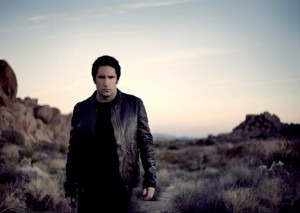 Nine Inch Nails is a one-man industrial-rock band whose symphonic noise and intense, alienated lyrics have attracted millions. The diviner of this millenarian angst is Trent Reznor, who writes, arranges, performs, and produces all of Nine Inch Nails’ material.
Nine Inch Nails is a one-man industrial-rock band whose symphonic noise and intense, alienated lyrics have attracted millions. The diviner of this millenarian angst is Trent Reznor, who writes, arranges, performs, and produces all of Nine Inch Nails’ material.
Reznor grew up isolated in the small town of Mercer, Pennsylvania, where he studied classical piano, switching to keyboards and playing in garage bands as a teen. He dropped out of Pennsylvania’s Meadville College, moved to Cleveland, and recorded a self-made demo. That tape got him signed to TVT, an independent label best known for compilations of TV jingles.
Pretty Hate Machine was coproduced by Flood (Depeche Mode, U2), John Fryer (Love & Rockets, Cocteau Twins), and Adrian Sherwood and Keith LeBlanc. It yielded three college-radio hits, most notably “Head Like a Hole,” the video for which got extensive MTV play. Although the album vented an extremely dire, introspective outlook, it sold a million copies. This was at least in part due to the fact that Reznor assembled a band that spent three years on the road promoting Pretty Hate Machine, in the process dazzling audiences at the 1991 Lollapalooza Tour and opening for Guns n’ Roses in Europe.
NIN spent so long touring because Reznor was suing to be released from TVT, who he said didn’t support him artistically or financially. Several other companies were interested in NIN, and when TVT wouldn’t let Reznor go, Interscope negotiated an agreement to co-release the band. Interscope also gave Reznor his own label, Nothing. Broken (Number Seven, 1992) was recorded during this period in a number of locations “without the permission of The Record Label,” as the liner notes say. The EP is an intensely devastated and devastating document, once again masterminded by Reznor, with three tracks coproduced by Flood. NIN had Coil and Foetus’ Jim Thirwell remix tracks from Broken on Fixed.
Broken debuted at Number Seven on the pop albums chart, while “Wish,” a track from the record, won a Grammy for Best Metal Performance in 1993. Reznor tested the freedom granted by his new record company on the video for “Happiness in Slavery,” which showed a man being sexually tortured and ground into a pulp by a machine – a visualization of NIN’s own tortured nature as a synth band venting human emotions and an apt metaphor for Reznor’s feelings about the music business. This was not the first controversial NIN video: “Sin,” from the first album, was refused by MTV for its images of genital piercing and gay men smearing blood on each other, while outtakes from “Down in It” were investigated by the FBI, which suspected that they were culled from a snuff film.
Working on his next album in L.A., Reznor moved into the house where Charles Manson’s followers murdered Sharon Tate. Flood again co-produced, and the album featured guitarist Adrian Belew. The Downward Spiral (1994), a dense, depression-filled, and uncompromising work, debuted at Number Two on the chart and went on to sell 5 million copies.
In the summer of 1994, NIN appeared at the Woodstock ’94. A version of “Happiness in Slavery” from the live album culled from performances at the festival earned NIN its second Grammy for Best Metal Performance, in 1995. In 1996, Reznor co-produced shock-rocker Marilyn Manson’s Antichrist Superstar (the two men later had a falling-out). Reznor also produced the soundtracks for Oliver Stone’s Natural Born Killers (1994) and David Lynch’s Lost Highway (1997).
Accolades from both the rock and mainstream press were pouring in by this time, with Time magazine naming Reznor one of the 25 most influential Americans. In 1999 NIN released its first studio album in five years, a despairing double CD called The Fragile (Number One). Working with a broader sonic palette than before, Reznor tempered his throbbing cacophony with moodier, subdued moments. Rolling Stone hailed the record as “a brutal and delicate masterpiece.” “The Day the World Went Away” debuted at Number 17 on the Billboard Hot 100 chart to become the first Top 40 single of NIN’s career.
All that Could Have Been, a live disc and video documenting the Fragile tour cycle, followed in 2002. Reznor resurfaced three years later with another Number One studio album from Nine Inch Nails, With Teeth, which included the Number One Modern Rock singles “Every Day is Exactly the Same” and “Only.” NIN was slated to perform the anti-George W. Bush song “The Hand That Feeds” at the 2005 MTV Video Music Awards but dropped out when the channel refused to allow the group to perform in front of a large image of the president.
The group toured through 2006, stopping briefly for Reznor to put together another set of studio tracks, and resumed touring in 2007. The bleak Orwellian concept album Year Zero (Number Two) arrived in April, spawning the Number One Modern Rock hit “Survivalism.” The album included a pre-release marketing campaign that involved an elaborate online alternate reality game offering fans clues to the album’s storyline, and a remixed version (Y34R Z3R0 R3M1X3D), offered fans the opportunity to contribute their own remixes of the tracks online. Reznor, long unhappy with the music industry, announced that October that Year Zero had been his contract-ending release for Universal Music Group and that he would release all future music independently.
In 2008, within two months of each other, Reznor released two albums: Ghosts I-IV, an entirely instrumental album, was released in March and The Slip, released in May, was given away as a free download. In February, 2009, Reznor announced that, while Nine Inch Nails would still record new music, he would stop touring for the foreseeable future.
Nine Inch Nails is available for corporate events, private shows, milestone celebrations (birthday, anniversary), fundraisers, festivals, and more.

